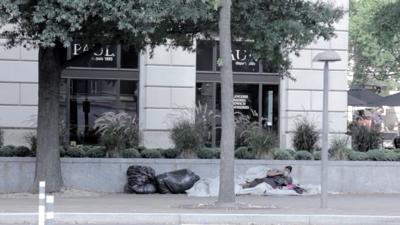Caletta Harris didn’t plan on becoming an activist. She didn’t plan on dedicating years of her life to advocacy on behalf of Columbia’s homeless. Back in 2013, she was simply a filmmaker running her own production company, Reel2Real Productions, which focused on commercials, promotional videos,and live events.
Then one day she saw an article that made her angry and changed her life.
“I was reading the Free Times in my office in downtown Columbia, and I saw that the Columbia City Council wanted to do something about their homeless issue, and (the homeless) only had three options: Get out of town, go to this shelter on the outskirts of town, or be subject to going to jail if you’re caught on the street,” Harris recalled.
Harris referred to two controversial programs that former Council Member Cameron Runyan floated to back in 2013, Columbia Cares and Emergency Homeless Response, both of which essentially proposed “evicting” Columbia’s homeless population in one way or another.
The story of these proposals is a complicated and chaotic one, and Harris was not the only person who was outraged. She was, however, in a position to do something about her outrage.
“I’m just a human with a heart,” she said. “When I read that, it motivated something in my spirit to be that vision and that voice for my community. I thought, ‘Well, I already have a production company, why don’t I just start studying what’s going on around me?”
That was Harris’ first step on a seven-year path that led her to “No Address,” a documentary series about homelessness in different places. At present, three entries have been announced: The first, released last year, spotlights Columbia; a second installment, looking at Atlanta, is slated to come out later this year; and a third, concerned with California, is scheduled for 2022.
From 2013 to 2020, Harris worked on “No Address” in fits and starts, covering as many aspects of the homelessness crisis as she could think of.
“It starts with how we got into this spot,” Harris explained. “I went all the way to DC to talk with people from the National Coalition for the Homeless, where they basically deal with the unsheltered population on a national level, and the National Law Center on Homelessness and Poverty. And then it moves on to Columba back in 2013 when the City Council voted to criminalize homelessness, and then they retracted it because of the outrage in the community.”
She also collaborated closely with Judy Turnipseed, an activist and founder of the Columbia nonprofit Homeless Helping Homeless.
“Judy is a big voice in this,” Haris said. “She basically narrates the documentary because she’s been boots-on-the-ground for decades, feeding the homeless and clothing the homeless.”
She emphasized that “No Address” tells a variety of stories.
“You will see the unsheltered people being advocates being at the City Council meetings,” she said, “and you will hear individual stories of a lot of people involved, breaking down the stereotype of what homelessness looks like. It looks like all of us. You will see stories that are relatable to what anybody else goes through on a day-to-day basis. You’ll see the progression of some people obtaining homes and jobs, and you’ll see practical solutions and calls to action.”
The docuseries took seven years to make for both practical and emotional reasons.
“I would work on it and take a year off because I was still trying to do my work for my clients,” Harris offered. “And then I’d use those funds to fund the documentary. But there were also times when I was editing it when I had to take breaks because I would get emotional. One man, we really connected with him and his girlfriend, he had this injury and it got infected and he got really sick and passed away. It was one of the most devastating experiences that I’ve ever had.”
“No Address” expanded from a single documentary film to a series because Harris started traveling to other cities to learn how they handled their homeless population.
“I have a friend in Raleigh,” she said, “and I went and just started filming and talking to people on the streets, and that evolved into talking to people in the shelters. Atlanta’s episodic in itself because there’s a lot going on. Every city has a story.”
For a while, Harris wasn’t sure anyone would see those stories.
“Last year, we had a screening at the Spotlight Cinemas,” she remembered, “and after that we were going to go on tour. We were setting that up and COVID hit and theaters closed. I found a way I could release it through my website, but it still wasn’t getting the views I wanted.”
Thadeus Jones Jr., director of programming at Columbia arthouse cinema the Nickelodeon Theater, suggested including the Columbia installment as part of the Nick's ongoing Virtual Screening Room during the pandemic, where it is currently available to watch.
“No Address” is now being shown virtually in six theaters around the country, and Harris said that most of those theaters are donating a portion of their ticket sales to advocacy groups and nonprofits for the unsheltered.
“This is systemic, and it can happen to any one of us,” she said of homelessness. “I want to create awareness and then create change. I wanted people to break down their walls and their stereotypes.”
“No Address: Columbia”
Streaming through April 10. $12. nickelodeon.org.









